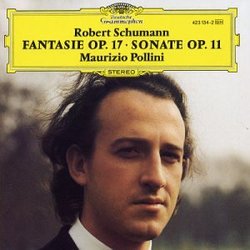| All Artists: Robert Schumann, Maurizio Pollini Title: Robert Schumann: Sonata for Piano No. 1, Op. 11 / Fantasia, Op. 17 - Maurizio Pollini Members Wishing: 0 Total Copies: 0 Label: Polygram Int'l Original Release Date: 1/1/1987 Re-Release Date: 10/25/1990 Album Type: Import Genre: Classical Styles: Forms & Genres, Fantasies, Sonatas, Historical Periods, Romantic (c.1820-1910) Number of Discs: 1 SwapaCD Credits: 1 UPC: 028942313422 |
Search - Robert Schumann, Maurizio Pollini :: Robert Schumann: Sonata for Piano No. 1, Op. 11 / Fantasia, Op. 17 - Maurizio Pollini
 | Robert Schumann, Maurizio Pollini Robert Schumann: Sonata for Piano No. 1, Op. 11 / Fantasia, Op. 17 - Maurizio Pollini Genre: Classical
|
Larger Image |
CD DetailsSimilar CDs
|
CD ReviewsPERPLEXING PARAGON DAVID BRYSON | Glossop Derbyshire England | 10/06/2004 (5 out of 5 stars) "It may tell us something about Pollini that these eminent (and far from recent) performances are only now receiving their first notice here. On the face of it, he is the piano player who has everything. His technical command is absolute and total, his taste is impeccable, his range of interests is wide, his temperament is equable and free from eccentricity, he is the personification of quality and he is dependable in the last degree. What he does not seem to arouse is a great deal of passion in general, and I have to admit to being of this mind about him myself. He first came to notice with a performance at age 17 of Chopin's E minor concerto, and I overheard someone say only a few years ago that it was the best thing Pollini ever did. It's hard even to find anything much missing from his playing in terms of emotion or sensitivity. And yet, when push comes to shove, I would have great difficulty in thinking of anything that I would sooner hear played by him than by anyone else. These two Schumann readings come about as close to that as anything else by him does. I have owned for many years another superb account of the C major fantasy, in my own view Schumann's very greatest instrumental composition, by Richter, and I have just come by a fascinating live performance of the F # sonata by Cherkassky, a very un-Pollinian experience as you would expect and a gripping one. I would not say that I prefer either to Pollini's version, but that is as far as I can go. In the sonata Pollini is majestic without falling into solemnity. The quirky Schumannesque romps are as lively as anyone could surely wish for, the inward `Eusebius' passages have real romantic poetry and eloquence, and of course Pollini handles the big chunky chordal sequences without the slightest hint of squareness or awkwardness. He has a firm grip on the overall design too, keeping the composer's dubiously-integrated episodes from becoming a thing of shreds and patches (or patches anyhow), as can happen when lesser interpreters get hold of them. In the fantasy it would take a lot to equal Richter, but to my ears Pollini does it. This great piece might seem almost to have been composed with Richter in mind. His special Innigkeit and introversion are perfect for the first, and particularly for the last, movements. I thought I sensed a difference at the start, where Richter is a touch warmer and Pollini slightly more regal and commanding, but in all honesty it doesn't amount to much, and in fact the general approach that both titans take to the outer movements is not at all dissimilar, what difference there is being mainly in the distinctive sound-quality of each, nicely and sensitively reflected in the recording each is given, with very minor variations of detail in the interpretation. Perhaps surprisingly, the real divergence comes in the march that takes the middle position between the slow outer movements. The composer's dynamic marking at the start is a slightly puzzling `mezzo-forte'. Pollini's approach is the one I usually hear, the tone fairly big, although with plenty in reserve for later. Richter is very restrained indeed to begin with, although he opens out a bit before too long. As the piece progresses Richter allows himself a lot more latitude with variation of the tempo, but in a way that suits me very well and seems to me fine idiomatic Schumann style. Which do I prefer? What a good question. This disc does not have a very high sales-ranking, for whatever reason. I hope the reason is not lack of interest in the music. The sonata deserves to be better known to those interested in romantic piano music, and the great fantasy is given a performance to rank with the finest here. It may be that Pollini is just a little too reliable for his own good. The players who interest me more as a general rule all exasperate me at times, Pollini never that I can recall. Perfectionists, this is a disc for you." An Odd Bonus Feature of Watching Films Grady Harp | Los Angeles, CA United States | 08/19/2006 (5 out of 5 stars) "With a number of really fine films utilizing classical music as part of their musical scores these days, one important aspect of listening carefully to those scores summons memories of recordings that have been somewhat relegated to the less frequently heard selections in the library. Such is the case for this absolutely superb recording by Maurizio Pollini of music by Robert Schumann (Pollini's version of the Sonata No. 1 is used effectively in the film 'La Bestia nel cuore'). Pollini is a master craftsman, a magician with technique, and an intelligence that seeps out of every note he performs. Some would state that his performances are less than passionate, but for this listener his degree of passion is always there - just controlled enough to make the climaxes meaningful. Pollini's performance on this well-recorded release of the Schumann 'Piano Sonata No. 1 in F sharp minor ("Grosse Sonate"), Op. 11 is one of the finest currently available on CD. The work is too seldom played, for reasons unclear, as the sonata contains all the refinement and beauty of melodic line that is Schumann's hallmark. Pollini wisely pairs the Grosse Sonate with the 'Fantasie (Obolen auf Beethovens Monument)' for piano in C major, Op. 17 that allows him to display his impeccable virtuosity of technique along with a skillful use of timing and humor in the passages appropriate to that approach. It is a finessed performance and graces the Grosse Sonate with great sensitivity of programming. Highly recommended. Grady Harp, August 06 " Magnificent Scott N. Stone | Washington,, DC USA | 12/24/2007 (5 out of 5 stars) "I offer a third resounding vote to the lonely chorus of devotees to this disc. It has long been one of my personal favorites, and like the other reviewers I can only scratch my head and wonder why, sometimes, great performances of truly heroic music sometimes go unnoticed.
The pieces, intensely Romantic, are marked by frequent shifts from meditative to effusively passionate moods. Pollini's tremendous physical strength and virtuosity make these shifts sound natural and effortless. There is no squeal of brakes or roar of acceleration, only grand, noble and sublime music pouring forth, animated by Schumann's own manic muses. The climax of the final movement of the Fantasie must be one of the greatest in all piano music -- practically lifting me bodily out of my seat every time I hear it. Strongly recommended. " |

 Track Listings (7) - Disc #1
Track Listings (7) - Disc #1


